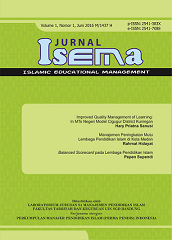BALANCED SCORECARD PADA LEMBAGA PENDIDIKAN ISLAM
DOI:
https://doi.org/10.15575/isema.v1i1.4983Abstract
Balanced Scorecard adalah metoda yang dikembangkan Robert S. Kaplan dan David P. Norton untuk mengukur setiap aktivitas yang dilakukan oleh suatu organisasi dalam rangka merealisasikan tujuan organisasi tersebut. Balanced Scorecard semula merupakan aktivitas tersendiri yang terkait dengan penentuan sasaran, tetapi kemudian diintegrasikan dengan sistem manajemen strategis. Balanced Scorecard bahkan dikembangkan lebih lanjut sebagai sarana untuk berkomunkasi dari berbagai unit dalam suatu organisasi. Balanced Scorecard juga dikembangkan sebagai alat bagi organisasi untuk berfokus pada strategi. Penilaian kinerja dengan Balance Scorecard diterjemahkan dalam empat perspektif yaitu: (1) perspektif finansial, (2) perspektif konsumen, (3) perspektif bisnis internal, dan (4) perspektif pembelajaran dan pertumbuhan. Bagaimana Balanced Scorecard diterapkan di lembaga pendidikan Islam merupakan tujuan dari penulisan ini.Downloads
Published
2019-06-23
Issue
Section
Articles
License
Authors who publish with this journal agree to the following terms:
- Authors retain copyright and grant the journal right of first publication with the work simultaneously licensed under a Creative Commons Attribution License that allows others to share the work with an acknowledgment of the work's authorship and initial publication in this journal.
- Authors are able to enter into separate, additional contractual arrangements for the non-exclusive distribution of the journal's published version of the work (e.g., post it to an institutional repository or publish it in a book), with an acknowledgment of its initial publication in this journal.
- Authors are permitted and encouraged to post their work online (e.g., in institutional repositories or on their website) prior to and during the submission process, as it can lead to productive exchanges, as well as earlier and greater citation of published work (See The Effect of Open Access).

